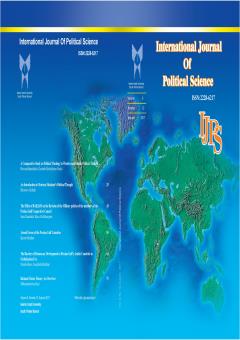Populist thought (Narodniks) in Russia an analytical study from Spragens' point of view
Subject Areas :
Mahin Niroomand Alankesh
1
,
Garineh Keshishyan Siraki
2
![]() ,
Jahangir Karami
3
,
Jahangir Karami
3
1 - Department of Political Science, South Tehran Branch, Islamic Azad University, Tehran, Iran
2 - Department of Political Science, South Tehran Branch, Islamic Azad University, Tehran, Iran
3 - Member of the Faculty of World Studies University, Tehran University, Tehran, Iran
Keywords: Political thought, Populism, Narodniki, Russia, Spragens' method of analysis,
Abstract :
The idea of populism or Narodniki in Russia has received less attention in Iran because it has been placed in the shadow of Russian communist leftist ideas. Conceptually, this idea is far beyond populism and Russian communism, and has had wide-ranging effects both in Russia and outside of this country. How this thought has been able to be so in-fluential is the main issue in this article that the authors have tried to analyze with the aim of investigating its roots, dimensions and consequences. In fact, the main question is how populist thought appeared in Russia and why did it become an effective and wide-spread trend? The hypothesis of this article is that the idea of populism emerged as a reaction to the neglect of the role of the people in the political life of Russia in the sec-ond half of the 19th century, and because of its acceptance by intellectuals and based on a combination of three British constitutional and democratic views. French socialism and Russian nativism were spread. To investigate this hypothesis, we have used the ana-lytical-descriptive method of political thoughts from the perspective of Thomas Spra-gens and in a qualitative format. The finding of this article is that social issues have aris-en and the intellectual responses of thinkers, despite their own timeliness, have been re-produced in a way for centuries and are still useful and very important for understanding the social and political conditions of the periods after that.
Barzegar, Ibrahim (2004). The Palestinian issue in contemporary Islamic politi-cal thought and Spragens' research method, Journal of Law and Politics Research, 6th year, number 12.
Berdyaev, Nikolai (2004). The Roots of Rus-sian Communism and Its Meaning, translated by Enayatullah Reza, Teh-ran, Khurshid Afarin Publications.
Berlin, Isaiah (1998). Russian thinkers, trans-lated by Najaf Darya bandari, Teh-ran, Kharazmi publications.
Clarkson, Jesse D. (1961). A History of Rus-sia. New York. Random House.
Don, John. M. (2005). The Russian Revolu-tion, translated by Soheil Sommi, Tehran, Qoghnoos Publications.
Fader, Kim Brown (2006). Russia, translated by Mahsa Khalili, Tehran, Qoghnoos Publications.
Haghighat, Seyed Sadeq (2019). Political Science Methodology, Tehran, Mofid University Press.
Haghighat, Seyyed Sadeq and Hejazi (2010). a critical look at the application of Spragens' crisis theory in political studies, Political Science Quarterly, No. 49.
Hoffman, Thomas. J. (2013). The Metaphys-ics of Modern Existence, A Spragens Analysis. Indigenous Polity Journal, Vol. xxiv, No 2.
Karami, Jahangir (2019). The Tragedy of Russia's Modernization, Tehran, Teh-ran University Press.
Khoshbayan Sarvestani, Amin and Mahro Maher (2015). Explaining the causes and factors of Muslim divergence from the perspective of Sheikh Mo-hammad Hossein Kashif al-Ghita (based on the model of understand-ing political theories of Thomas Spragens), the second international congress of religious culture and thought, Qom: Mobin Cultural Am-bassadors Institute.
Koolaei, Elahe (2000). Soviet Union from Formation to Collapse, Tehran, Min-istry of Foreign Affairs Publications.
MacIntyer, Alasdair, (1990). The Privatiza-tion of Good: An Inaugural Lecture, Review of Politice, 52,344-61.
Mathews, John R. (2003). The Rise and Fall of the Soviet Union, translated by Fa-rid Javaherkalam, Tehran, Qoghnoos Publications.
McDaniel, Tim (2010). Autocracy, Moderni-zation and Revolution in Russia and Iran, translated by Parviz Dalirpour, Tehran, Sabzan Publishing.
Sanai, Mehdi (2019). Russia, Society, Politics and Government, Tehran, Samt Pub-lications.
Scott, Jean-Paul (2012). History of Russia: From Peter the Great to today (Putin), translated by Seyyed Hamid Razithi, Tehran, Amir Kabir Publica-tions.
Shakibi, Zhand (2019). Russia's Westerniza-tion, Tehran, Negarestan Andisheh.
Spragens, Thomas (2015). Understanding Political Theories, Translation of Farhang Rajaii, Tehran, Agah Pub-lishing.
Strickler, Jim (2002). Tsarist Russia, translat-ed by Mehdi Haghighatkhah, Tehran, Qoghnoos Publications.
Taggart, Paul (2019). Populism, Tehran, translated by Hassan Mortazavi, Ashian Publishing.
Watson, H. Seton (1964). The Decline of Im-perial Russian. London.
Берлин, Исайя (2017). Pусские мыслители, Издательство: "Энциклопедия-ру"
Кудров В.М. (2007). Национальная экономика России- Учебник, 2-е изд., испр и доп., М., Дело.
Причина, М. А. (2002). Формирование политических ориентаций в контексте развития политической культуры российского общества, Научные исследования: доп теории к практике, материалы XI Междунар. науч.-практ.
конф. (Чебоксары, 12 февр. 2002 г.). В 2 т. Т. 1 / редкол.: О. Н. Широков, Чебоксары: ЦНС «Интерактив плюс», № 1 (11).

